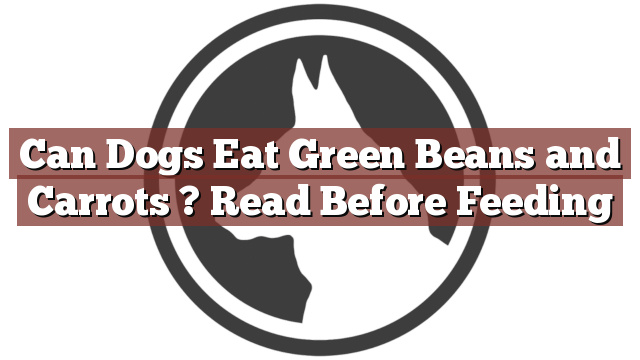Understanding Your Dog’s Dietary Needs
Before incorporating any new food into your dog’s diet, it is essential to understand their dietary needs. While dogs are omnivores, meaning they can consume both meat and plant-based foods, their diet should primarily consist of high-quality protein. This protein can be obtained from sources such as chicken, beef, or fish. Additionally, dogs require a balance of carbohydrates, fats, vitamins, and minerals to maintain optimal health.
Can Dogs Eat Green Beans and Carrots? Read Before Feeding
Can dogs eat green beans and carrots? The answer is yes. Green beans and carrots can be a healthy addition to your dog’s diet, provided they are prepared and served appropriately. Both vegetables are low in calories and rich in fiber, making them beneficial for weight management and bowel regularity in dogs.
When introducing green beans and carrots to your dog’s diet, it is important to cook them thoroughly and avoid adding any seasonings or oils. Raw vegetables can be difficult for dogs to digest, leading to gastrointestinal discomfort. Steaming or boiling the vegetables until they are soft ensures that they are easily digestible by your furry friend.
Pros and Cons of Feeding Green Beans and Carrots to Dogs
Feeding your dog green beans and carrots can offer several benefits. These vegetables are packed with essential vitamins and minerals, including vitamin A, vitamin C, potassium, and beta-carotene. These nutrients can support your dog’s immune system, promote healthy vision, and help maintain proper cell function.
Another advantage of incorporating green beans and carrots into your dog’s diet is the added fiber content. Fiber aids in digestion and can prevent constipation in dogs. It also provides a feeling of fullness, which can be helpful for dogs who need to manage their weight.
However, it is important to remember that every dog is unique, and their dietary needs may vary. Some dogs may have allergies or sensitivities to certain foods, including vegetables. It is always recommended to consult with your veterinarian before introducing any new food to your dog’s diet.
Conclusion: Considerations for Including Green Beans and Carrots in Your Dog’s Diet
In conclusion, green beans and carrots can be a healthy and nutritious addition to your dog’s diet. They offer a range of vitamins, minerals, and fiber that can support your dog’s overall health and well-being. However, it is crucial to prepare them properly and take into account your dog’s individual needs and any potential allergies. Remember to consult with your veterinarian to ensure that green beans and carrots are suitable for your furry friend. By feeding them in moderation and as part of a balanced diet, you can enjoy the many benefits that these vegetables provide to your beloved canine companion.
Thank you for taking the time to read through our exploration of [page_title]. As every dog lover knows, our furry friends have unique dietary needs and responses, often varying from one canine to another. This is why it's paramount to approach any changes in their diet with caution and knowledge.
Before introducing any new treats or making alterations to your dog's diet based on our insights, it's crucial to consult with a veterinarian about [page_title]. Their expertise ensures that the choices you make are well-suited to your particular pet's health and well-being.
Even seemingly harmless foods can sometimes lead to allergic reactions or digestive issues, which is why monitoring your dog after introducing any new food item is essential.
The content provided here on [page_title] is crafted with care, thorough research, and a genuine love for dogs. Nevertheless, it serves as a general guideline and should not be considered a substitute for professional veterinary advice.
Always prioritize the expert insights of your veterinarian, and remember that the health and happiness of your furry companion come first.
May your journey with your pet continue to be filled with joy, love, and safe culinary adventures. Happy reading, and even happier snacking for your canine friend!

